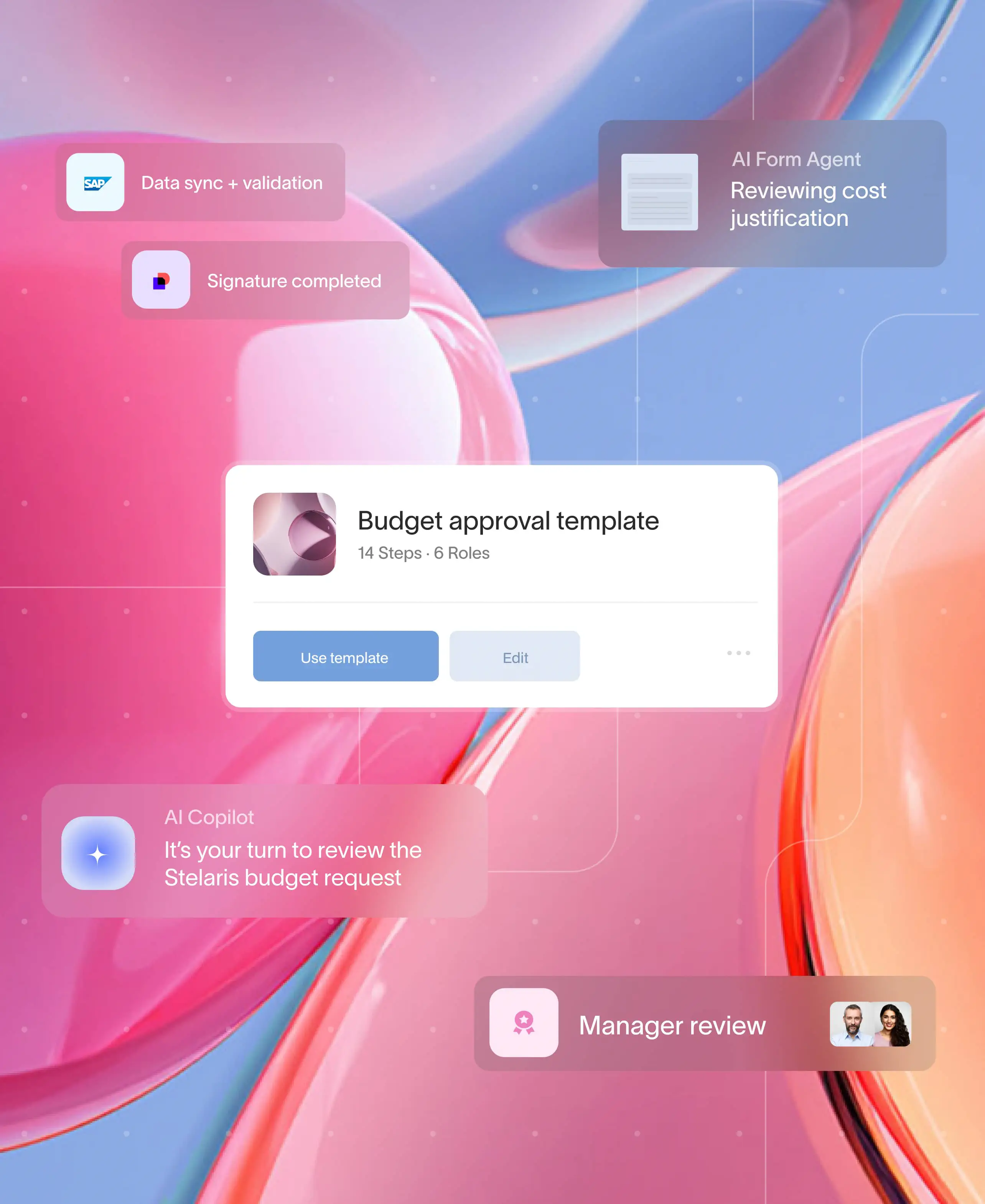.png)
At a glance
Building a client management process in Moxo transforms fragmented communication into a unified workflow.
Teams can design flows for onboarding, delivery, or renewals using templates, approvals, and automations.
Dashboards track performance and highlight client risks or delays.
Moxo provides a no-code builder for creating secure, branded client workflows end to end.
Mapping your client lifecycle is only the beginning — the real transformation happens when you automate and measure it.
With Moxo, you can build workflows that connect internal teams and external clients, automate repetitive tasks, and track performance through live dashboards.
The cost of not modernizing client management
Many firms continue to rely on email and spreadsheets to manage client workflows. While familiar, these tools create operational blind spots and risks that grow as client volume increases.
Time lost to email
According to McKinsey, employees spend nearly 28% of their workweek on email communications. Client onboarding or approvals managed this way suffer from delays, missed attachments, and frustration.
Compliance risks
Industries like legal, accounting, and financial services face growing audit demands. Yet email threads cannot meet SOC 2, SOC 3, or GDPR requirements. Without secure audit trails, firms risk penalties and reputational damage. Moxo security addresses this gap with encryption, access controls, and audit-ready reporting.
Rising client expectations
Clients expect mobile-first, branded portals to track progress, upload documents, and sign contracts. A disjointed experience leads to churn and lost referrals. Firms offering secure client portals instantly differentiate themselves by delivering modern, frictionless collaboration.
Who this guide is for
Operations leaders, client services, success, and PMO teams that need a repeatable, compliant, and data-driven client process without a heavy IT lift.
Prerequisites (10 minutes)
- Confirm process stages: Intake → Onboarding → Delivery → Governance → Renewal/Upsell → Offboarding.
- List owners per stage (RM, Delivery, Finance, Legal, Compliance).
- Gather required docs (KYC, contracts, SOWs) and SLAs per step.
Why acting now matters
Three forces are reshaping client management:
Regulatory compliance: Auditors demand clear logs of approvals and data exchanges. Without audit trails, firms are exposed.
Client experience: Professional services firms win and retain clients with transparent, branded digital interactions.
Scalability: Manual processes cannot keep pace with growth. With Moxo, firms handle 75% more clients with the same headcount, as highlighted in customer stories.
How to build a client management workflow in Moxo (step by step)
Step 1: Create a new flow (choose a template)
The Moxo Flow Builder allows firms to create workflows from scratch or adapt prebuilt templates for faster setup.
For example:
- An accounting firm can launch a Client Onboarding flow preloaded with file requests and approval steps.
- A consulting firm can use a Project Management template with milestone tracking and automated updates.
- A financial services firm can configure a KYC workflow with document collection and compliance reviews.
Templates drastically reduce setup time, enforce structure, and ensure workflows are compliance-ready from the start.
Pro tip: Explore workflow templates in Moxo’s library to accelerate deployment — they’re built around best practices for common client-facing processes.
Step 2: Add business actions — forms, file requests, approvals, eSign
Business actions are the building blocks of every client workflow. They define what happens at each stage:
- Forms capture structured client data securely, eliminating spreadsheet back-and-forth.
- File requests allow clients to upload documents directly into the portal with encryption and role-based access.
- Approvals and eSignatures route contracts and reviews without third-party tools.
Example: A consulting firm that migrated onboarding to Moxo reduced cycle time by 50%, as noted in customer stories.
These actions ensure every step of your workflow has clarity, accountability, and traceability.
Step 3: Add controls — branches, decisions, milestones
Complex workflows need conditional logic and accountability controls. In Moxo, you can configure:
- Branches: Create alternate approval paths for high-value clients or sensitive contracts.
- Decision points: Automatically route tasks to reviewers based on client type or deal size.
- Milestones: Mark critical checkpoints to improve visibility for leadership and clients.
Example: A legal services firm used branching logic to route sensitive agreements through compliance, while allowing standard contracts to flow directly to client sign-off.
These controls transform linear workflows into dynamic, context-aware systems.
Step 4: Automations and third-party integrations
Automation eliminates repetitive work, prevents delays, and reduces manual errors.
With Moxo’s integrations, firms can:
- Send reminders automatically when clients miss deadlines.
- Escalate stalled approvals to senior reviewers.
- Sync signed contracts and key data back to Salesforce, HubSpot, NetSuite, or SharePoint.
Moxo becomes the orchestration layer connecting your CRM, DMS, ERP, and payment systems — without disrupting existing infrastructure.
Tip: Start with a few critical automations (reminders, approvals, CRM sync) — then expand once adoption stabilizes.
Step 5: Enable AI Agents — Review, Support, Form
Moxo’s AI Agents bring intelligence into workflows while keeping human oversight intact:
- Review Agents validate forms, detect missing data, and flag potential compliance issues.
- Support Agents answer client FAQs inside the portal, reducing manual workload.
- Form Agents auto-fill client details using previously submitted data.
Example: A logistics firm deployed AI in Moxo to handle shipment inquiries — automating 70% of requests while escalating exceptions to staff, saving dozens of hours weekly.
AI Agents improve accuracy, reduce rework, and let humans focus on higher-value tasks.
Step 6: Publish with Magic Links and notify participants
Once your workflow is configured, publish it with Magic Links — secure, no-login links that let external users participate without creating accounts.
Clients receive automatic notifications when:
- Tasks are assigned,
- Documents are requested, or
- Approvals are completed.
Example: In verified customer reviews, clients consistently highlight how Magic Links removed friction — no more juggling portals or forgotten passwords.
Magic Links make collaboration seamless, secure, and user-friendly for every participant.
Step 7: Track KPIs in management reporting
With your workflow live, Moxo’s reporting dashboards provide visibility across all client processes.
Track:
- Cycle times — end-to-end process duration.
- Approval delays — where bottlenecks appear.
- SLA adherence — percentage of tasks completed on time.
- Client satisfaction scores — feedback from integrated surveys.
Example: A financial services firm discovered that 70% of onboarding delays came from missing client documents. After redesigning its intake flow in Moxo, average onboarding time dropped from three weeks to one.
These insights help leaders move from reaction to prediction — using data to continuously refine processes.
Step 8: Optimize continuously
Moxo makes it easy to evolve your process without rebuilding.
- Review dashboards weekly to identify bottlenecks.
- Update templates with new best practices or regulatory changes.
- Use AI summaries to detect recurring issues from client messages.
- Refresh SLAs quarterly and reassign owners as needed.
Over time, your workflows become self-optimizing — continuously improving efficiency, compliance, and client experience.
Summary: 7 steps to build, automate, and optimize client management in Moxo
Quick takeaway
Moxo transforms static processes into living, measurable workflows.
From intake to offboarding, every client touchpoint becomes structured, automated, and insight-driven — reducing manual effort while improving transparency and trust.
Pro tip: Revisit your workflows every quarter — update SLAs, refine automations, and review KPIs. Process excellence isn’t a project; it’s a practice.
Evidence of impact
Real-world examples from Moxo customer stories:
- Consulting firm: Cut approval cycles by 50% using templated workflows.
- Accounting firm: Reduced audit prep by 30% through automatic audit trails.
- Logistics provider: Automated client inquiries with AI triage to free staff for complex cases.
On G2, users consistently report measurable ROI: “We cut client email by 80%. Approvals happen twice as fast, and clients actually enjoy the process.”
The ROI of building in Moxo
Moxo transforms process efficiency into measurable financial gains.
Time savings
If each employee saves 5 hours weekly:
- 5 hours × $60/hr = $300 per employee.
- With 50 employees = $15,000 weekly, nearly $780,000 annually.
Compliance savings
A law firm reduced audit prep by 30% after adopting Moxo, avoiding the need to expand compliance staff and saving $100,000 annually.
Client retention
According to Bain & Company, even a 5% increase in retention boosts profits by 25%. By modernizing workflows in Moxo, firms increase renewal and referral rates.
Try the Moxo ROI calculator to estimate your firm’s potential savings.
How Moxo helps
Building your first client workflow in Moxo takes minutes. The no-code workflow builder lets teams design, automate, and monitor every client interaction from one dashboard.
Start by creating stages for intake, onboarding, project delivery, and renewal. Add automations for notifications, SLAs, and handoffs.
Client portals host every task and file securely, and dashboards show status at a glance. Audit-ready records ensure transparency and compliance.
Moxo enables teams to go from process design to live execution quickly—creating client workflows that scale with precision and visibility.
Track performance and highlight client risk
Email and CRMs alone cannot handle the complexity of modern client workflows. The result is wasted time, compliance exposure, and dissatisfied clients.
With Moxo, firms design and deploy secure, automated, and branded processes in days. Features like Flow Builder, AI Agents, Magic Links, and reporting dashboards provide the orchestration that CRMs lack. The payoff is measurable: faster cycle times, fewer emails, stronger compliance, and higher client retention.
Get started today by exploring the ROI calculator or booking a demo.
FAQs
How long does it take to build a process in Moxo?
Most firms launch their first workflow in days using workflow templates.
Does Moxo integrate with my CRM?
Yes. Moxo integrations ensure client-facing actions update records in your CRM, ERP, or document system automatically.
Is Moxo secure enough for regulated industries?
Yes. Moxo security includes SOC 2, SOC 3, GDPR compliance, encryption, MFA/SSO, role-based access, and audit trails.
What ROI can I expect from Moxo?
Most firms see ROI in 3–6 months. Efficiency gains come from faster approvals, fewer emails, and higher client capacity. Test scenarios with the ROI calculator.
What is the pricing model?
Moxo offers flexible plans based on the number of portals, workflows, and users. Explore the pricing page.






